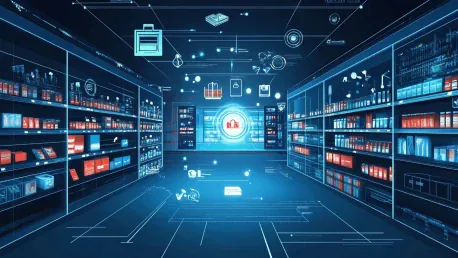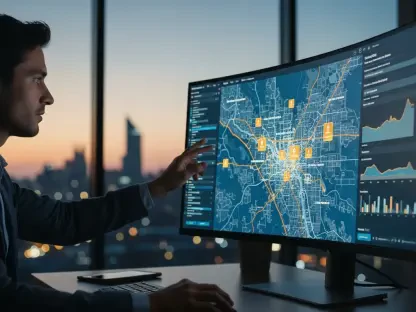The retail industry is undergoing a transformative phase, driven by the integration of advanced digital technologies that streamline operations, enhance customer experience, and maintain competitiveness in an ever-evolving market. Retailers and related companies are leveraging a variety of innovative solutions to stay ahead, from automated self-serve technology to immersive virtual production. These advancements are not only revolutionizing traditional retail practices but also shaping the future of the shopping experience.
Digital Integration and Partnerships
Retailers are highly focused on forming strategic partnerships to support their digital expansion efforts. A notable example of this is the collaboration between L&G and Limited Space, which has introduced digital media assets across L&G’s retail and leisure portfolio. This initiative includes the deployment of new D6 DOOH screens and premium large-format landscape screens. These digital roll-outs signify one of the most extensive and technologically advanced digital networks in the UK’s retail and leisure sectors. The strategic move aims to enhance brand visibility and customer engagement, underlining the importance of digital partnerships in modern retail.
This level of digital integration is crucial for modernizing physical retail environments. By incorporating advanced digital assets, retailers can provide dynamic content that captures customer attention, drives foot traffic, and promotes sales. These high-tech enhancements help create an engaging shopping experience and allow retailers to stay competitive in a digital-first world. Additionally, digital partnerships facilitate the sharing of technological expertise and resources, resulting in more efficient and impactful roll-outs.
Automated and Self-Serve Technology
Another significant trend within the retail industry is the adoption of automated and self-serve technology. Boxbar Tech’s implementation of an automated self-serve bar at the Reggae Land festival exemplifies this shift towards automation. The setup included 54 Points of Sale and 108 serving taps, significantly streamlining the event management process. Automated self-serve kiosks and checkouts are becoming increasingly common in retail environments, aiming to improve efficiency and customer service by reducing wait times and operational costs.
The expansion of automated solutions is not limited to events; everyday retail operations also benefit from automation. Retailers are investing in self-checkout systems and kiosks to enable customers to complete transactions swiftly without the need for store staff involvement. This technological transformation not only enhances the customer experience but also frees up employees to focus on more complex tasks, ultimately improving productivity and service quality.
Immersive Virtual Production
The integration of immersive virtual production technologies is another key development reshaping the retail landscape. Walmart’s setup of a new TV studio equipped with a curved LED wall from Alfalite is an example of this trend. This advanced setup allows Walmart to incorporate extended reality (XR) into its broadcast network, enhancing its video content creation capabilities. This innovation offers higher flexibility and resolution, elevating the production quality of visual content and creating an engaging experience for customers.
The use of immersive technology like XR in retail is indicative of a broader trend where retailers strive to create more dynamic and interactive content. By leveraging these advanced tools, brands can produce high-quality videos and interactive ads that captivate their audiences. This approach not only enhances customer engagement but also enables retailers to convey their brand messages more effectively, ultimately driving better business outcomes.
E-commerce and Fast Delivery Options
E-commerce continues to evolve with advancements aimed at improving delivery services, which remain a crucial aspect of online shopping. The partnership between Inovretail, Uber Direct, and Flower Station highlights the importance of fast, same-day delivery services. This collaboration provides customers with real-time tracking and swift delivery, catering to the increasing demand for convenience and speed in online shopping.
In addition to prioritizing delivery speed, inclusivity in delivery services is gaining more attention. For instance, Forage and Southeastern Grocers’ collaboration with DoorDash to launch SNAP EBT grocery delivery showcases a commitment to providing accessible and inclusive services for all customers. These innovations underline the importance of efficient delivery solutions in meeting consumer expectations and maintaining a competitive edge in the e-commerce landscape.
Customer Experience Platforms
Enhancing the customer experience remains a primary objective for retailers, leading to the development of sophisticated customer engagement platforms. Digital retailer Very, for instance, introduced the Beauty Inspiration Hub, which features educational and aspirational blog-style content. This platform complements its existing Beauty Studio, providing customers with valuable information to improve navigation and overall shopping experience.
These customer experience platforms are designed to offer more than just products; they aim to educate, inspire, and engage customers on a deeper level. By providing seamless user interfaces and engaging content, retailers can keep customers invested in their brand. Such initiatives help foster customer loyalty and drive repeat business, as customers are likely to return to platforms that offer an enriching and enjoyable shopping experience.
AI and Data-Driven Decision Making
AI-powered platforms are revolutionizing the retail industry, particularly in the realm of decision-making. Mango’s implementation of the o9 Digital Brain platform exemplifies how AI can enhance merchandise financial planning, assortment planning, and demand planning capabilities. These advanced tools enable retailers to make data-driven decisions, optimizing inventory management, and improving overall operational efficiency.
The adoption of AI-driven decision-making tools allows retailers to stay competitive in a data-driven market. These platforms analyze vast amounts of data to provide insights that can lead to more informed and strategic business decisions. By leveraging AI, retailers can better understand customer preferences, predict trends, and tailor their offerings accordingly, ultimately leading to increased sales and improved customer satisfaction.
Retail Loyalty Programs
Customer retention remains a critical focus for retailers, and loyalty programs play a fundamental role in achieving this goal. EG America’s relaunch of its SmartRewards program using PAR Technology’s platform is a prime example. The revamped loyalty program aims to deepen connections with customers across its convenience store locations by offering personalized rewards and experiences.
Modern loyalty programs leverage digital connectivity to provide more tailored and engaging rewards systems. By understanding customer preferences and shopping behaviors, retailers can create personalized offers that resonate more with their audience, fostering customer loyalty and encouraging repeat business. Such initiatives are integral to contemporary retail strategies, helping brands maintain a loyal customer base in a competitive market environment.
Payment Technology
Secure and efficient payment processing is vital for retail operations, and retailers are continuously seeking advancements in this area. Co-op’s extended partnership with ACI Worldwide for payment orchestration highlights the necessity of advanced payment systems. These systems ensure smooth transactions and enhance customer trust by supporting various payment options.
Efficient payment technology not only accommodates diverse customer preferences but also contributes to a seamless shopping experience. Advanced payment processors offer quick, secure methods for completing transactions, reducing the risk of fraud, and increasing customer satisfaction. The integration of cutting-edge payment solutions is essential for modern retailers looking to provide customers with reliable and hassle-free shopping experiences.
Digital Shelf Labels
To optimize in-store operations, retailers are increasingly adopting digital shelf labels (ESLs). For example, Company Shop’s use of Pricer’s ESL system allows for the dynamic updating of product information and prices. This reduces the need for manual updates, thereby enhancing operational efficiency and reducing labor costs.
ESLs provide real-time updates and streamline inventory management, demonstrating the significant impact of digital solutions on traditional retail processes. This technological approach is especially beneficial for managing large product ranges, ensuring that price changes and stock information are accurately and swiftly communicated to customers, ultimately improving the overall shopping experience.
Material Recovery and Recycling
Sustainability efforts are becoming integral components of retail operations. ReBound Returns’ partnership with ESO Recycling, which focuses on transforming non-resellable footwear into new materials for societal projects, underscores this commitment. Retailers are recognizing the importance of environmental responsibility and are integrating recycling and material recovery practices into their operations.
These sustainability initiatives highlight the retail industry’s ongoing efforts to minimize environmental impact. By participating in recycling and material recovery programs, retailers can contribute to broader environmental goals while also appealing to increasingly eco-conscious consumers. Such initiatives are key to building a sustainable future for the retail sector.
Retail Media Technology Integration
The integration of retail media technology is playing an influential role in enhancing market presence and customer connections. The Heureka Group’s collaboration with GoWit aims to link e-shops and brands with their target customers, expanding market presence in Central and Eastern Europe. This strategic use of media technology enables precise targeting and effective communication with customers.
Utilizing retail media technology allows brands to reach their audience more efficiently, creating personalized marketing campaigns that resonate with specific customer segments. This approach not only enhances customer engagement but also strengthens brand influence and market reach. The effective use of media technology is crucial for retailers looking to thrive in the digital age, ensuring they remain connected with their customers and competitive in their market.
Future Perspectives
The retail industry is experiencing a significant transformation spurred by the integration of advanced digital technologies. These innovations are designed to streamline operations, enhance customer experiences, and help businesses maintain their competitive edge in an ever-evolving marketplace. Retailers and companies connected to the industry are embracing a range of cutting-edge solutions. Automated self-service technologies, for example, are becoming more common, allowing customers to check out with minimal human interaction. This not only speeds up the process but also ensures a smoother, more efficient shopping experience.
Furthermore, immersive virtual environments are beginning to play a key role in retail. These technologies enable consumers to virtually try on clothes, explore products in a 3D space, or even attend virtual showrooms and stores. These digital advancements are not just revolutionizing traditional retail practices but also shaping the future of shopping. The integration of these new technologies is setting the stage for a more interactive, personalized, and efficient retail landscape. As a result, the retail industry remains vibrant and dynamic, constantly evolving to meet the new demands and expectations of modern consumers. Consequently, retailers who adapt to these changes are more likely to thrive in this fast-paced, technologically advanced environment.









